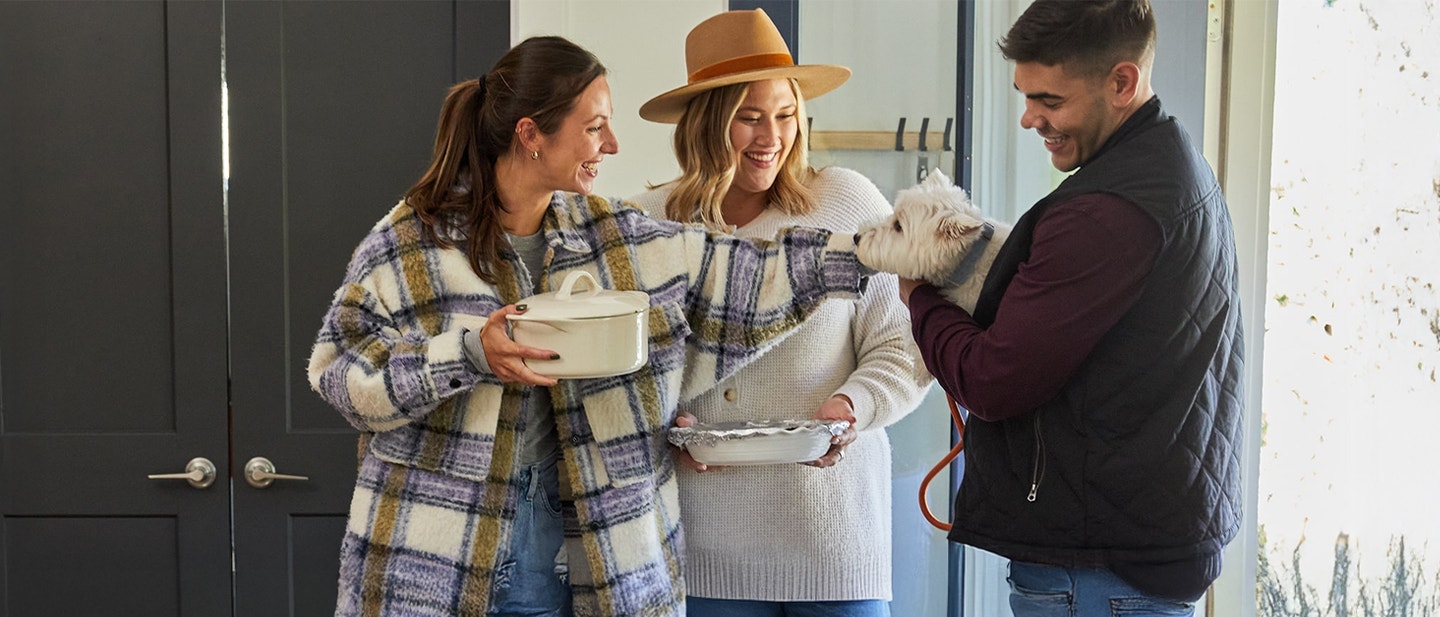
What Foods Can Small Dogs Eat and What Should They Avoid?
Helping to keep your small dog happy and healthy is easy: Just give them lots of love, pets, and delicious, nutritious food to eat. When it comes to love and pets, go crazy! But when it comes to the question of what food dogs can eat, you have to be a bit more careful.
In this article, we discuss the foods that your small dog should and shouldn’t eat and give you feeding tips that will help your companion live their best life.
What Do Small Dogs Like to Eat?
All dogs, whether they’re small or large, are omnivores and can get the energy and nutrients they need from both plant and animal foods. That means they should eat foods that contain the three main macronutrients: protein, carbohydrates, and fats.
This is similar to your own diet (because you’re an omnivore as well), but is completely different from cats, which are obligate carnivores and can only obtain energy and nutrients from protein sources.
Why do we bring this up? Because it highlights the importance of feeding your small dog food that’s specifically formulated to give them what they need.
So, just like you, your pup can eat a wide variety of foods, such as chicken, salmon, rice, corn, and broccoli. They may also have a taste for things that aren’t good for them, such as feces, dead animals, and a number of human foods that you might not realize can harm them.
As a responsible pup parent, it’s important to know what food dogs can and cannot eat.
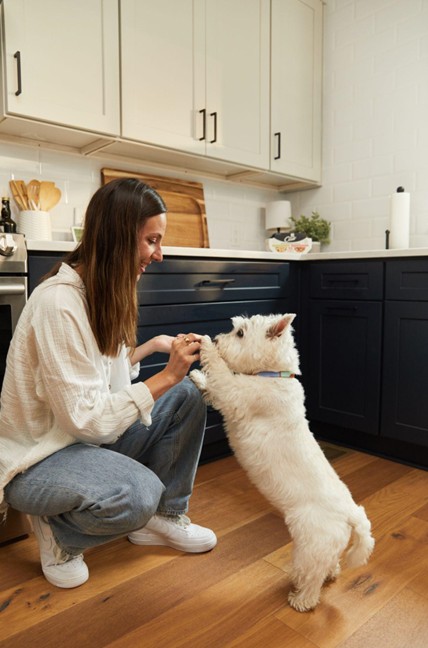
What Foods Can Small Dogs Eat?
Protein
Protein is an important macronutrient for your small dog’s health because it:
Serves as the building block for bones, muscles, skin, fur, and nails
Helps their body repair and replace cells
Helps create necessary hormones and enzymes
Provides energy(open in new tab)
Supports their immune system
Can provide essential amino acids
Good sources of protein for small dogs include:
Chicken
Beef
Eggs
Lamb
Cooked fish (remove bones)
Turkey
Duck
The amount of protein your dog needs each day depends on their age, breed, size, and activity level(open in new tab). Ask your vet for more information about the types of protein that are best for your small dog and how much they need every day.
Carbohydrates
Sources of carbohydrates encompass a broad range of foods(open in new tab) including grains, fruits, and vegetables. Here are some examples of the different types of carb-containing foods your dog can eat.
Grains
Rice
Oats
Barley
Wheat
Quinoa
Pasta (plain and without seasoning)
As whole foods, be sure to cook these grains before feeding them directly to your dog. It’s also important to note that pasta should not be a regular part of your dog’s diet, but it won’t make your dog sick if they were to consume some.
Fruit
Apples
Blueberries
Cranberries
Raspberries
Bananas
Mangoes
Cucumber
Vegetables
Sweet potato
Carrots
Green beans
Kale
Spinach
Broccoli
Pumpkin (not the pie filling you use at Thanksgiving)
Wash all fruit and veggies before feeding them to your dog and remove all seeds, pits, and cores so they don’t harm your dog.
Healthy Fats
Healthy fats serve as an energy source and help your dog digest and absorb the vitamins, minerals, and other nutrients they need to lead an active life.
Here are some of the healthiest fats for your canine friend:
Animal fat
Olive oil
Flaxseed oil
Coconut oil
Vegetable fat
While the plant-based fats mentioned above are good for your dog, the best option is animal fat because, among other things, it’s a complete source of linoleic acid — an essential fatty acid that your dog’s body needs to function properly.
Talk to your dog’s vet for more information and recommendations on dietary fat levels, and look for a dog food brand that offers complete nutrition tailored for small dogs, like the many varieties of CESAR® Canine Cuisine(open in new tab).
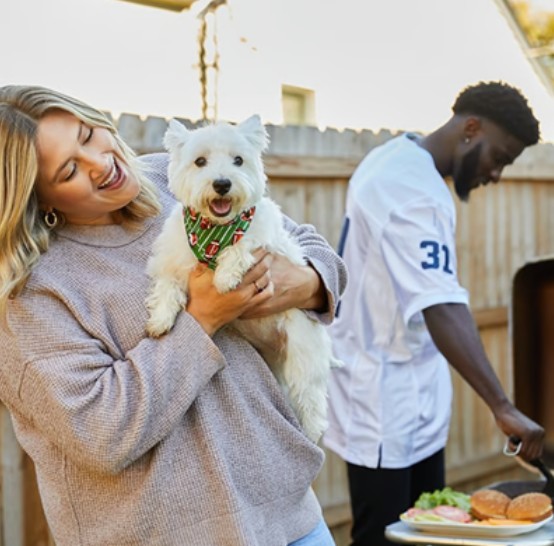
What Foods Should Small Dogs Avoid?
Now that you’ve got a good idea what foods dogs can eat, you may be wondering, "What can dogs not eat?".
The following common foods — things you might find in your cabinets or on your dinner table — are toxic to dogs:
Grapes
Raisins
Onions
Garlic
Chocolate
Cinnamon
Avocado
Cooked Bones
Xylitol
Alcohol
Table Scraps
Grapes and raisins (even in small amounts) can cause kidney failure.
Onions and garlic contain compounds that can damage your small dog’s red blood cells and cause anemia.
Chocolate contains theobromine and caffeine, which can be harmful and even fatal for dogs if consumed in large quantities.
Cinnamon in any form can irritate the inside of your pup’s mouth and affect their blood sugar in such a way that it causes diarrhea and vomiting.
Avocado contains persin, which can cause vomiting and diarrhea in dogs.
Cooked bones can splinter and cause injury.
Xylitol is a sugar substitute (common in human foods and safe for our consumption) that can cause low blood sugar and liver failure in dogs. Xylitol can often be found in gum and candy.
Alcohol is a no-no for all dogs because their bodies can’t handle it as well as our bodies can. Even small amounts of alcohol can lead to vomiting, tremors, and even coma.
Table scraps often contain one or more of the foods mentioned above. For example, you might not realize that the leftover steak on your plate has traces of onions and garlic on it that can harm your small dog.
Keep in mind that this is not an exhaustive list of foods dogs shouldn’t eat. If you’re unsure about something, avoid giving it to your dog and then ask your pup’s vet for more information.
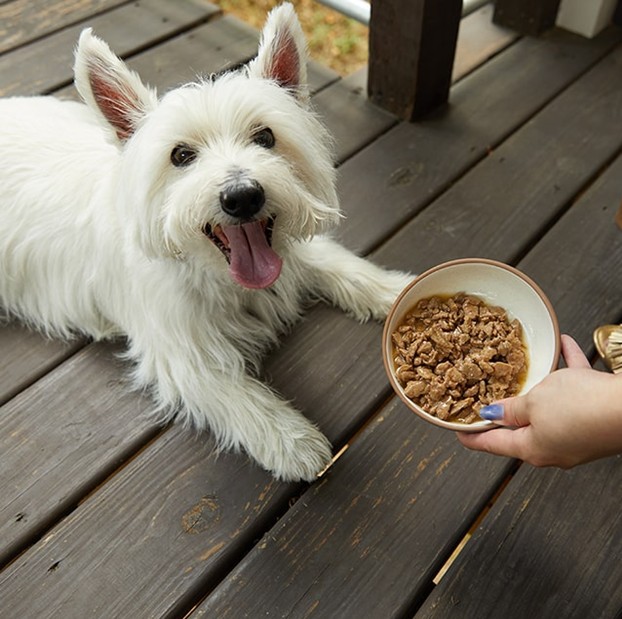
Small Dog Feeding Tips
Ask Your Vet
While it’s always best to avoid the harmful foods covered in this article, ask your vet what foods are safe to feed your small dog.
They will likely have specific recommendations about not just which foods to avoid, but also which foods to include in your dog’s diet (and how much) based on their breed, size, age, and activity level.
Choose a High-Quality Dog Food
Serving your canine companion high-quality dog food(open in new tab) at every meal helps to support their health and to maintain energy throughout the day. But not all dog foods are created equal.
Look for one that meets the nutritional levels established by the AAFCO(open in new tab) Dog Nutrient Profiles for Maintenance, is specifically formulated for small dogs, and is committed to supporting their health and well-being (like CESAR® Canine Cuisine(open in new tab)).
Follow the Feeding Guidelines on the Package
It’s also important to feed your dog the right amount of high-quality dog food. Too much or too little and your dog can develop health issues.
Always follow the feeding guidelines on the package. Then talk to your vet to see if you need to adjust the amount you give out at every meal based on your dog’s breed, size, age, and activity level.
Stick to a Regular Feeding Schedule
You like to eat on a regular schedule that includes breakfast, lunch, and dinner (with maybe a few snacks thrown in), right? Your dog is no different.
Like you, your dog is a creature of habit and prefers to stick to a regular feeding schedule.
Regardless of whether you feed your pup two or three times a day, do so at set times. This can help regulate their digestion and make it easier for them to understand when it’s time to eat.
Offer Treats Sparingly
We love our dogs and want them to be happy. That’s the motivation behind giving them treats.
But too many treats too often can lead to weight gain and an unbalanced diet that’s not good for their overall health and well-being. This is especially true for small dogs, who have smaller stomachs and can’t handle as much food as bigger dogs.
Talk to your vet about giving your dog treats and the amounts they recommend.
Always Provide Fresh Water
Dogs must have access to fresh water at all times. Fill and refill your dog’s water dish throughout the day, and make sure to wash the bowl periodically to get rid of bacteria that may accumulate around the rim and in the water itself.
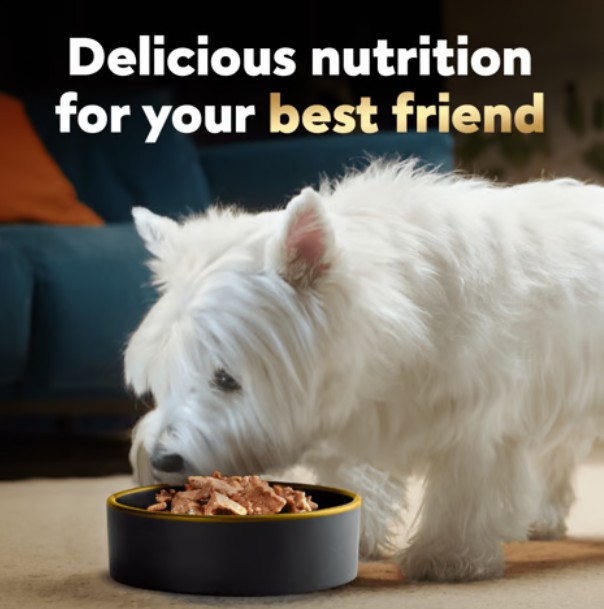
Delicious, High-Quality Food Your Small Dog Will Love!
One of the best things you can do for your small dog — other than giving them lots of love and pets, of course — is to feed them delicious, high-quality food specifically formulated for small breeds.
CESAR® Canine Cuisine is all that and more!
Our gourmet wet food is available in a wide variety of delicious flavors that your dog will come running for, including:
And that’s just the Classic Loaf in Sauce variety!
Check out CESAR’s Fresh Chef™(open in new tab), Simply Crafted™(open in new tab), Home Delights™(open in new tab), Wholesome Bowls™(open in new tab), Filets in Gravy(open in new tab), and Loaf & Topper in Sauce(open in new tab) varieties for even more delicious and nutritious flavors that will have your pup begging for more.
And more than just being delicious, CESAR® Canine Cuisine is carefully formulated to meet the nutritional levels for small dogs established by the AAFCO Dog Nutrient Profiles for Maintenance, so you know it’s nutritionally complete for them.
For more information on how to provide a happy and healthy life for your dog, explore more of CESAR.com(open in new tab) today.
Sources




